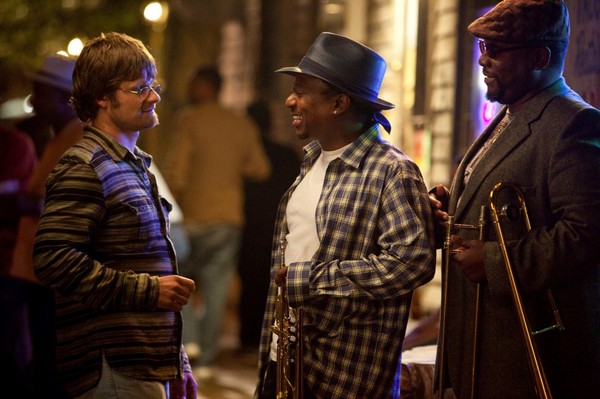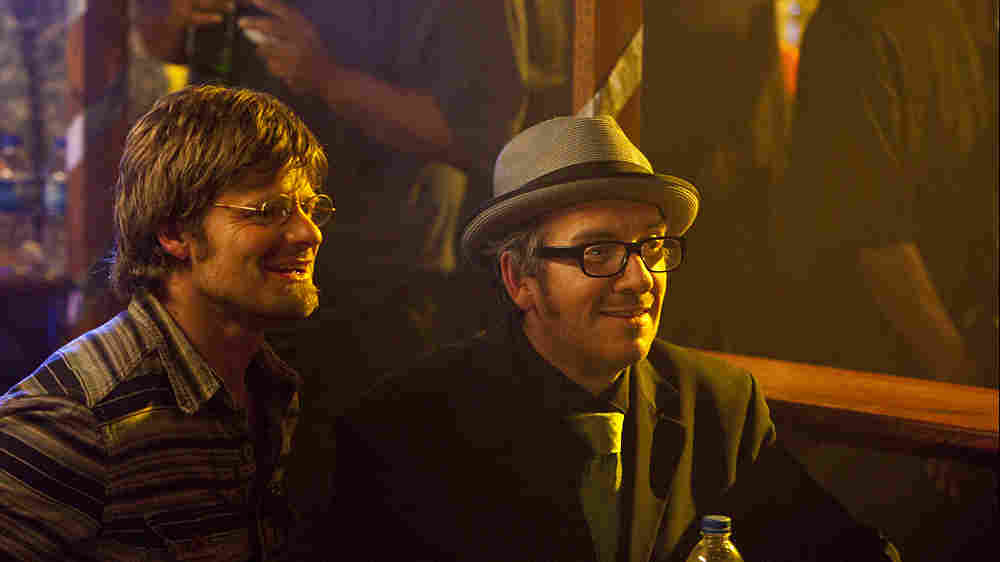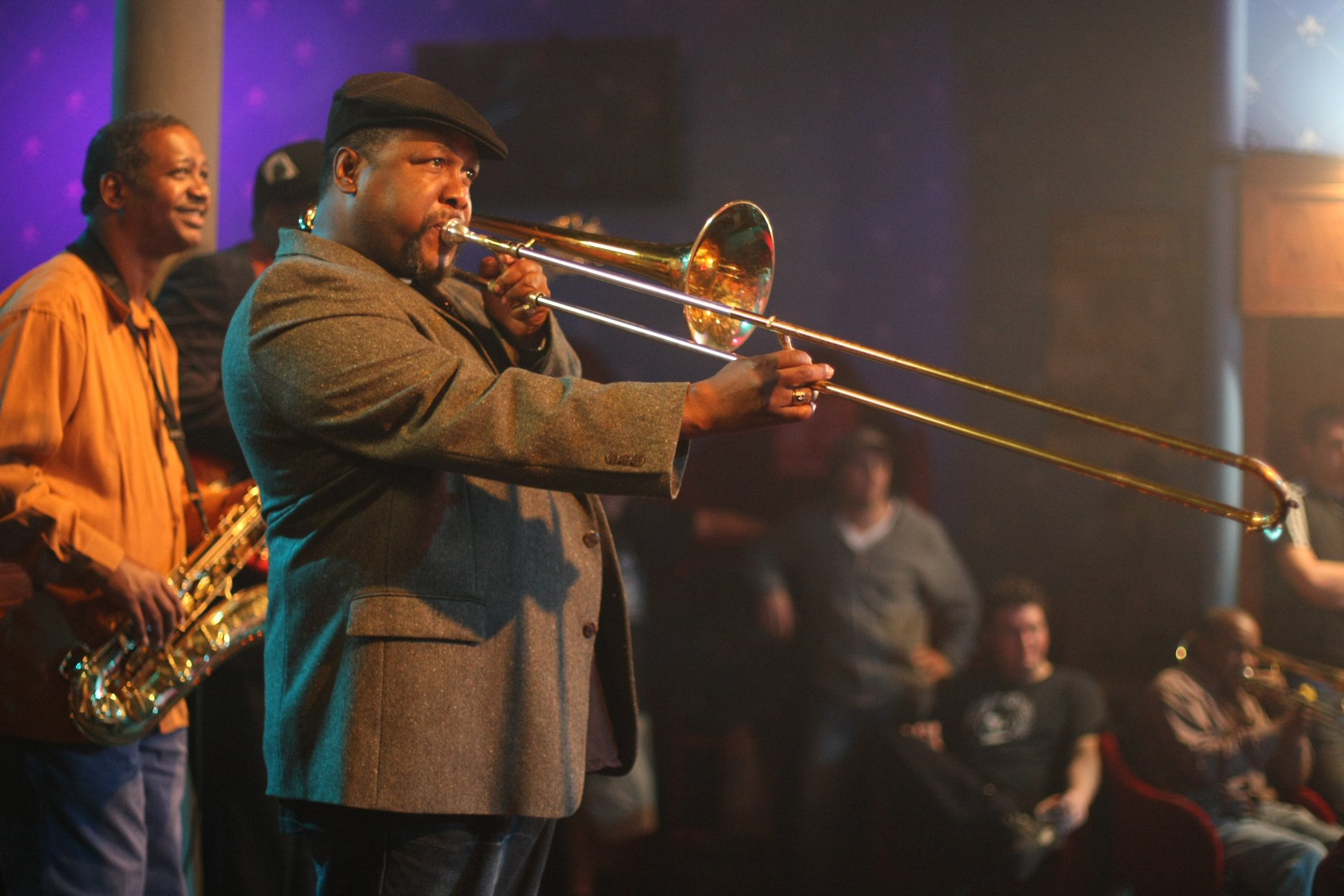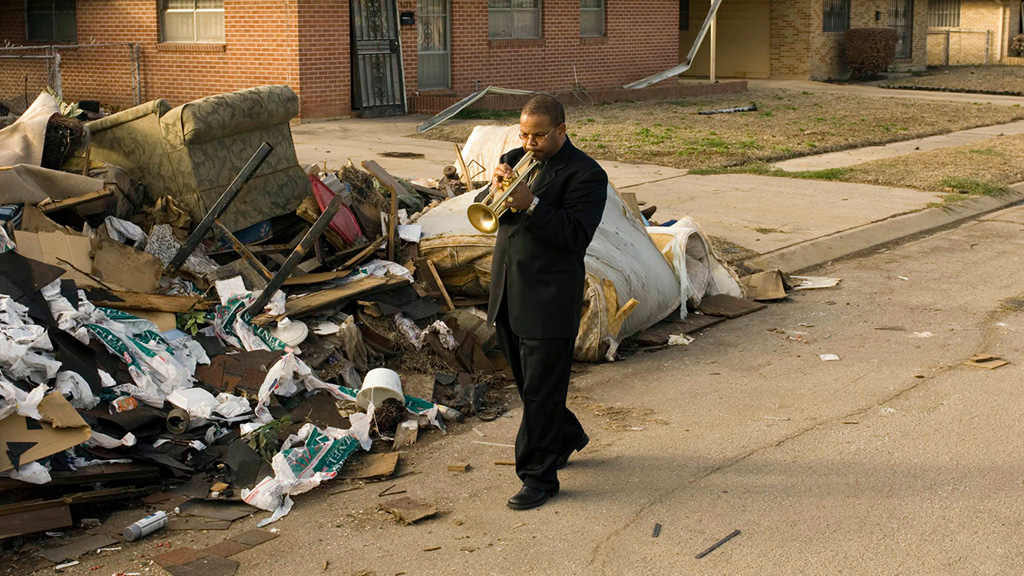
Karolyn and I seldom catch TV shows when they first go out, preferring to go at our own pace and in our own time. We catch up eventually, though. Watching the series "Treme" was a special viewing experience for us. We will miss following our New Orleans friends (LaDonna and Delmond and Toni, Albert and Antoine and Annie, etc.,) around as they rebuild and heal and begin again in the years following Katrina. There is a palpable sense that these lives go on even now that the cameras are off. Only today, I thought of Terry (David Morse), an honest cop, a good man. Important to remember a good man too, in these times when we rail, and quite rightly, against police brutality. And to remember how Terry was hounded out for challenging the department's culture of brutality and corruption.
The show deserves a salute for being itself an act of preservation and curatorship of New Orleans heritage. It's a show about rebirth, created, written and produced by people rooting that rebirth on: David Simon and Eric Overmyer.
"Treme" beamed New Orleans culture all over the country (the music, the food), so we could learn about it in Chicago. That's how we learned about Kermit Ruffins and his code of partyin', about Mardi Gras Indians and Big Chief, and so much more. When we started visiting New Orleans together, the show enriched our visits; in turn, our visits enriched our experience of the show. We'd be sitting there on the couch watching the show after returning from New Orleans and a scene would appear set at Lil' Dizzy's or Vaughan's or Cafe Du Monde or the Praline Connection and we'd exclaim, Hey! we were just there!
We went to the gigs and started meeting musicians who'd played themselves on the show, like Kermit and Glen David Andrews.
The show's heart and soul was in the "Treme" neighborhood, the country's oldest African-American neighborhood, where those hit hardest by Katrina lived. It celebrated Treme's street culture.
The show deserves a salute as well for keeping its characters complex and human. Its people are sometimes weak but never really "bad," not even the councilman who finds himself wordlessly accepting bribes. As was true in Simon's and Overmyer's "The Wire," no one is ever merely an instance of a type. The excellent casting deserves a nod. Each character found his or her double in just the right actor.
The show's realism meant there were no false plot machinations (though plot was not the point, it's worth stating that the show's handling of multiple plotlines was deft). To critics who didn't love lingering on the music and moments, as we did, I suppose they would say there was no powerful story engine. For us, the story engine was all there in the rich Altmanesque tapestry, interwoven with real people and places, chefs and musicians, restaurants and clubs (Dr. John, John Boutte, Irma Thomas, Trombone Shorty, etc., etc.).
Every character gets a rich characterization.

Just one example sticks in my memory. I think of the encounter between Davis (Steve Zahn) and Nelson (Jon Seda). Davis is the groovy, slightly dysfunctional, stick-it-to-the-Man activist. He's a DJ, A walking encyclopedia of music, steeped in NOLA history, albeit a slightly fanciful version. He wants to preserve and protect NOLA's culture.
Nelson is the slick real-estate developer, a go-getter with an unsinkable personality. A carpetbagger, he comes into town from Texas after Katrina to siphon up some of the pork from all those rebuilding contracts flying around. Opportunistic, but likable for all that. His thing is get-'er-done efficiency. That said, he genuinely digs the local music, is genuinely interested in the people, curious about what makes them tick. He enjoys hanging out in the community, wants to learn. In final scenes he worries that he's never really made anything, anything except money. Both Nelson and Davis are are doing what they feel is right by their lights.
They first encounter each other as onlookers at a community hearing around plans for a new jazz center. Davis is there to support the community, Nelson as the "eyes-and-ears" for his developer boss. They strike up a chat; each is startled to find himself speaking with someone who sees the world so differently. The chat carries on over beers at local bars as Davis takes Nelson on a tour of the real New Orleans. It is fascinating to see the two of them kick around ideas and actually listen to each other. Each gives the other something to consider that maybe he hadn't thought of.
Not to belabor the point too much because the show doesn't, but it struck me that while the show's heart is with Davis, it does not dehumanize Nelson, the "suit." It seems to say that, going forward, NOLA is going to need the spirit of both of these guys. It is going to need all of the characters in this rich tapestry.
Then there is that final shot of the entire series. I won't give away it away; I will say that I think it finds the perfect image for funky, one-of-a-kind New Orleans. It's an image that says, here in this town we may not fix what's broken, not exactly. But we will make it into something beautiful, in its own strange way.

* * *
As a follow-up we also re-watched Spike Lee's heartbreaking, transcendent documentary on New Orleans and Katrina, "When the Levees Broke: A Requiem in Four Acts." It's no less a rich mosaic of humans. Phyllis Montana LeBlanc, a real New Orleans resident caught up in Katrina, is so vivid and funny and outraged that you can see why Simon thought she'd be great in "Treme" and would go on to cast her as Desiree. Sometimes Spike Lee cuts between her and the great Wendell Pierce, who would go on to play her rascally, good-hearted, 'bone-playing husband on "Treme," and it's fun because we know that they will go on to play the tempestuous but loving couple, Antoine and Desiree.
"When the Levees Broke" can make you angry to see how carelessly a corporate-run society treats its people. What happens to a society when you have oil industry people running this show? How little regard we have for the poor who pay the price for decisions made in high places to cut corners for private gain. How coarse is our ignorance of our country's true wealth: its music, its culture, its people. And yet we see good people too, people who behaved bravely in crisis and helped others. And we see resilience.
There are times when "When the Levees Broke" can restore your faith in humanity. Yet I think finally what it asks of us is just that we watch. Watch, in the sense of bearing witness. The tone finally is more elegiac, haunted, than angry. Not least because of Terrence Blanchard's haunting music.
